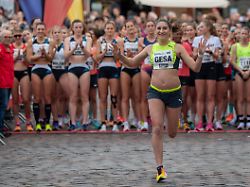Olympics in Paris as a big goal
Birth and baby are not an obstacle for Gesa Krause
December 31, 2023, 8:31 a.m
For many years, Gesa Krause has been one of the world’s best in the 3000 meter steeplechase, winning World Cup medals and becoming European champion twice. After the birth of her daughter, the 31-year-old is pushing back on her career. The goal is the Olympic final in Paris – the starting signal for this will be given in Trier.
The irrepressible ambition of the two-time European obstacle course champion Gesa Krause did not suffer during the maternity leave and the birth of her daughter Lola Emilia. “With a child you need to be more relaxed, but that doesn’t affect your ambition,” assured the 3,000-meter steeplechase runner. “Once it’s there, it won’t be lost through pregnancy.” Krause starts her comeback at the New Year’s Eve run in Trier with the goal of taking part in the Olympics for the fourth time in Paris in 2024.
“This is the first real competition. The training workload is increasing and I’m already in good shape,” said Krause. “I’m happy that things are really getting started again.” At her last start so far at the 2022 World Championships in Eugene, she experienced the opposite. Weakened by a glandular disease, the final race was torture, in which she ended up in 15th place as a medal candidate. She then canceled the home European Championships in Munich and the 2023 World Cup in Budapest because of her pregnancy.
“Now she is highly motivated. I hope that she gets back to her old form,” said coach Wolfgang Heinig. The training has progressed according to plan since the birth in April: “I hope she can get back to the region where she was two or three years ago. At least she won’t run behind.”
Coach Wolfgang Heinig: A European Championship medal is the big goal
Gesa Krause doesn’t believe that either. “I never really stopped,” emphasized the third-place finisher at the 2015 and 2019 World Cup. “I didn’t train for ten days, was quickly back on the cross trainer after the birth and was running again four weeks later,” she reported. “I didn’t really get out.” She has trained for many years and it is in her legs: “The body remembered it. So everything works quite well.” In October she had already run a half marathon in Cologne as part of her preparation; her time of 1:18:40 hours was enough for 49th place in the German annual best list.
The three-time Olympic finalist and fifth place at the 2021 Tokyo Games not only wants to run, but also wants to return to the top of the world. The chance of a top place or even a medal at the European Championships from June 7th to 12th in Rome without African competition will be far greater than at the Paris Games.
“Of course the Olympics are the highlight. But for Gesa, who has won the title twice, getting back on the podium at the European Championships is a big goal,” said Heinig. The track and field athlete from the Trier Silvesterlauf club is also hoping for this: “It would be nice to be somewhat successful in Rome. But first qualify, then the freestyle.”
Gesa Krause is looking forward to the sore muscles
She wants to create the basis for her plans and hopes during the indoor season. “It’s not my specialty, but I’ll compete in the 800, 1,500 and 3,000 meters to feel the competition tension and excitement as well as sore muscles again and to be prepared for what awaits me afterwards,” explained Krause.
The start at the German indoor championships on February 17th and 18th in Leipzig is planned, but will be fraught with trouble. The German association does not allow a double start. “This is absurd for athletes at the absolute top level, especially since there is always talk of a lack of competitive toughness,” complained Heinig. “In terms of schedule, it would be possible.” The DLV then explained that this rule was introduced because too often those registered twice only competed in one discipline and thus prevented other qualified people from starting. The regulation should now be examined and adjusted if necessary.
Apart from that, returning to the obstacle elite in Europe and the world will not be easy, especially since there are competitors in Germany like Lea Meyer, who won silver at the 2022 European Championships and can run times of around 9:15 minutes. The 2023 world rankings also include 16 runners who stayed under 9:15 minutes, including four from Europe. And four African women ran times under nine minutes – a world in itself.
Gesa Krause, the German record holder with 9:03.20 minutes, last ran under 9:15 minutes three times in 2021. It will become clear whether the Olympia mission was successful by August 6th in Paris at the latest, two days after her 32nd birthday. “Let’s see what she can conjure up on the street,” said coach Heinig.
